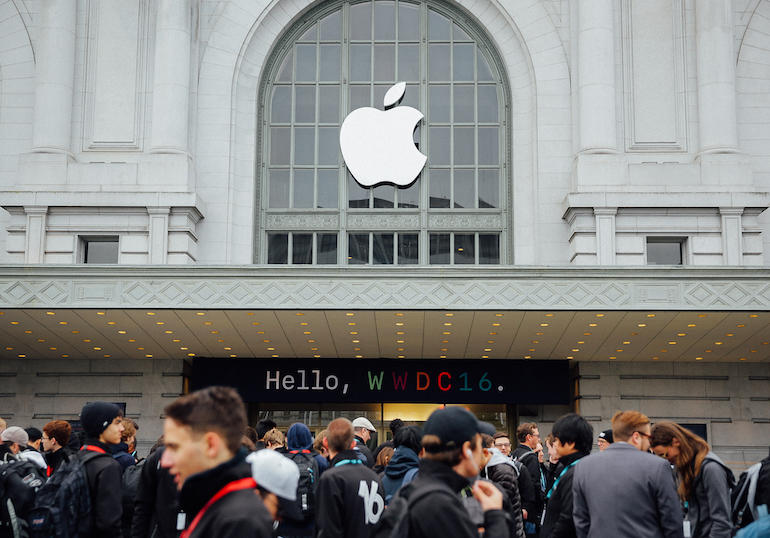

(Image: CNET/CBS Interactive)
All eyes will be on Apple as the week-long WWDC 2017 kicks off with the keynote speech. And while Apple fans will be salivating over iOS and macOS updates, along with whatever shiny new hardware is unveiled, it’s Siri that will make or break the event.
See also : Surface Pro (2017) vs. Surface Pro 4: Tech specs and key differences
This year’s WWDC will be an interesting time for Apple. For well over a decade the keynote has been a time when Apple could boast to the world — and more importantly, other tech companies — about how far ahead of the game it was, and how they had little hope of catching up.
But this time is different.
Apple is under pressure from multiple fronts. iPhone sales are teetering on the brink of a downturn, while iPad sales have crashed through the floor. And the company is lagging behind Microsoft when it comes to notebook innovation, trailing behind Amazon when it comes to getting hardware into the living room, and dawdling far behind Google and Facebook when it comes to AR and AI.
No matter what sort of face Tim Cook and the gang put on when they’re on-stage Monday, Apple is on the back foot, and it knows it.
But there’s one Apple product that could change all that — Siri.
It’s easy to look at Apple and think of it as a hardware company. After all, when most people think “Apple,” they think about the iPhone, Macs, iPads, and such. But the hardware is only part of the equation. In fact, building hardware isn’t hard — just look at how crowded the Android market is with devices ranging from treasures to total trash. Anyone with money can go to an ODM — Original Design Manufacturer — and get something drawn up and made.
What really sets Apple hardware apart is the massive software ecosystem at the back end.
Everything from iCloud to the App Store and the wider ecosystem, it’s all about the software.
And part of that software ecosystem is Siri.
Apple’s been playing it slow and carefully with Siri. Apple acquired the technology back in April 2010 and baked it into iOS 5 in 2011, and since then the technology has spread across Apple’s platforms to include macOS, watchOS, and tvOS.
But with Amazon and Google carrying out a full-on assault on the living room with speakers and smart devices, it’s time for Apple to push back. Because if it doesn’t, these players will slowly start to chip away at and erode Apple’s currently dominant ecosystem. After all, not only is someone who’s purchased a smart device from Google or Amazon less likely to buy a similar Apple device, but they’re also going to be looking at what else Google and Amazon have to offer, further weakening the ecosystem.
Now some might say that Apple already owns the living room, kitchen, and bedroom, because it owns the smartphone, tablet, and smartwatch market, and people take these devices with them as they move about the house.
But this is a weak argument.
With the exception of Apple TV, Apple’s hardware is aimed at a single user, and that makes it unsuited to home use. If your home automation setup is based around Apple, then you better make sure that everyone has iPhones and iPads, because it’s not like you can pick up someone else’s device to start controlling things. And this is where devices such as the Amazon Echo or Google Home really come into play. They’re devices that are aimed at the family, not the individual, and that means they’re far more convenient to use in a communal setting.
I’ve noticed it myself. While I used to have to turn to my iPhone to control the lights or some other bit of IoT kit, it’s far quicker and easier to bark a command at a nearby Echo or Dot than it is to whip out my iPhone and activate Siri.
And remember to factor in how cheap Echo Dots are compared to Apple products. At $49 they’re less than the price of two 2-meter Lightning cables from Apple.
But Siri is the tool that will let Apple keep up with Google and Amazon, because it allows the company to create an interface-free device that people can interact with semi-naturally (I say semi-naturally because none of the voice assistants are currently up to the task of dealing with natural language, and some form of linguistic gymnastics are always required, despite what you might see in the on-stage demos).
So, with all that said, here are my WWDC 2017 Siri-related predictions:
- A much-needed boost to Siri’s AI (essentially new sets of questions and commands it can respond to)
- Siri will be able to recognize users based on their voice (this would be a killer feature for a communal device)
- A new Siri-powered device, likely a speaker, think Apple TV, but for music (given Apple’s association with music, and the fact that it owns Beats)
- Text-based chatbot-style Siri (think along the lines of a smart search box)
- Make Siri able to work across devices (so, for example, Siri on the iPhone would be able to understand a command such as “open Numbers on my MacBook.”)

